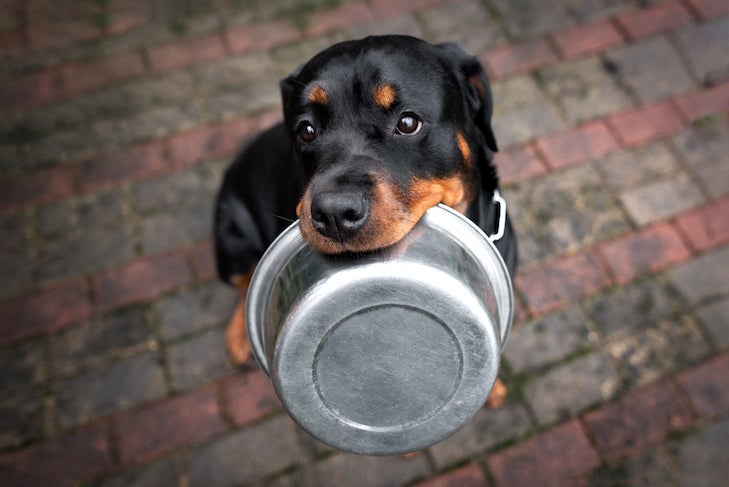When there are so many brands, ingredients, and ways to prepare dog food, it’s no wonder figuring out that what diet is best for your pet can get confusing. So what purpose do common ingredients like soy in dog food serve?
Soy Isn’t Just a “Filler”
One of the most prominent assertions about soy is that it’s a cheap filler with low nutritional value. Dr. George Fahey, Jr., Professor Emeritus of Animal Sciences and Nutritional Sciences at the University of Illinois Urbana-Champaign, explains that soy actually has very high nutritional value. “In dog foods, we use three soy products: soybean meal, soy protein concentrate, and soy protein isolate, in addition to soybean oil. The latter two products are more purified than soybean meal,” says Dr. Fahey. This means they’re more expensive than soybean meal, so they tend to be used sparingly in pet foods.

“Soy is used for its protein content, with soybean meal having between 44 and 48 percent crude protein. The other two products have more crude protein,” he explains. So the claims that it’s an inferior plant protein when compared to animal proteins are unfair.
Do Dogs Have Difficulty Digesting Soy?
You might have heard people saying that soy isn’t easy for dogs to digest. This can lead to gastric dilation volvulus (GDV), or stomach bloat. Dr. Fahey explains it’s actually very well-digested. In fact, amino acids in soybean meal are digested to the same extent as good-quality animal proteins.
While bloat won’t be an issue, wind might be. “Soybean meal still contains some compounds that can result in flatulence in the dog, namely the galactooligosaccharides, stachyose, raffinose, and verbascose. Thus, we recommend adding soybean meal to dog diets at no more than 10% of the formula to prevent this problem,” he says.
Dr. Fahey also explains that it’s possible to add soy protein concentrate and soy protein isolate at much higher dietary concentrations. But, because they’re expensive, they’re used sparingly in pet foods. He recommends avoiding formulas with soybean meal if your dog already has serious digestive issues, but there shouldn’t be any problems with the other soy products.

Does Soy Cause Allergies?
Dogs can consume soy and soy products as long as they don’t have a diagnosed soy allergy; it also matters how much soy a dog is ingesting. Dogs can have reactions to any food source, but it’s a myth that eating soy will automatically cause your dog to have an allergic reaction. In fact, some vets specifically prescribe dogs a hydrolyzed soy diet when diagnosing and treating allergies. The proteins in a hydrolyzed diet are broken into little pieces that pass through the digestive tract without the immune system recognizing them and causing a reaction.
While occurrences of allergies to soy are higher than in some food sources, this is likely because it’s such a widely used ingredient. But popular ingredients such as beef, chicken, and lamb are more common causes of allergy than soy.
Can Soy Cause DCM in Dogs?
The FDA is investigating the potential link between certain grain-free diets and canine dilated cardiomyopathy (DCM). The investigations are ongoing, but they list foods containing legumes as a primary ingredient as a concern. However, according to the FDA, there is no correlation between the high-fat legume soy and canine heart disease.
Soy Diets Can Help Manage Illnesses
There’s no evidence to suggest that normal levels of soy in dog foods can lead to illness; however, it can be beneficial for managing some conditions. Vets sometimes prescribe soy-based diets for dogs that have had bladder stones removed. The lower purine levels in plant proteins like soy can help prevent a recurrence.
Board Certified Veterinary Nutritionist Dr. Megan Shepherd explains, “A vegetarian (e.g. soy-based) diet can be helpful for patients with purine uroliths because (a) purines are richer in animal tissue, especially organ meat (e.g. liver) and (b) a vegetarian diet promotes a more neutral (higher) urine pH which favors dissolution of purine uroliths.”
Soy is also a common ingredient in diets for dogs with advanced liver disease, as it’s gentler on the organ than many animal proteins.

Should I Feed My Dog a Diet With Soy?
There’s no right or wrong answer here. Dr. Fahey explains that “dogs require nutrients, not ingredients, and they can obtain these nutrients from many, many different ingredients.”
It’s about reviewing the overall nutrient levels when selecting food for your dog. You want a healthy balance of proteins, carbs, and fats with an appropriate breakdown of amino acids, fiber, and fatty acids.
If you’re unsure where to start, look for reputable brands that include a nutritional adequacy statement on their dog food label that meets standards set by the Association of American Feed Control Officials (AAFCO). If you’re still feeling overwhelmed, reach out to a Board Certified Veterinary Nutritionist to set you and your dog on the right track.

